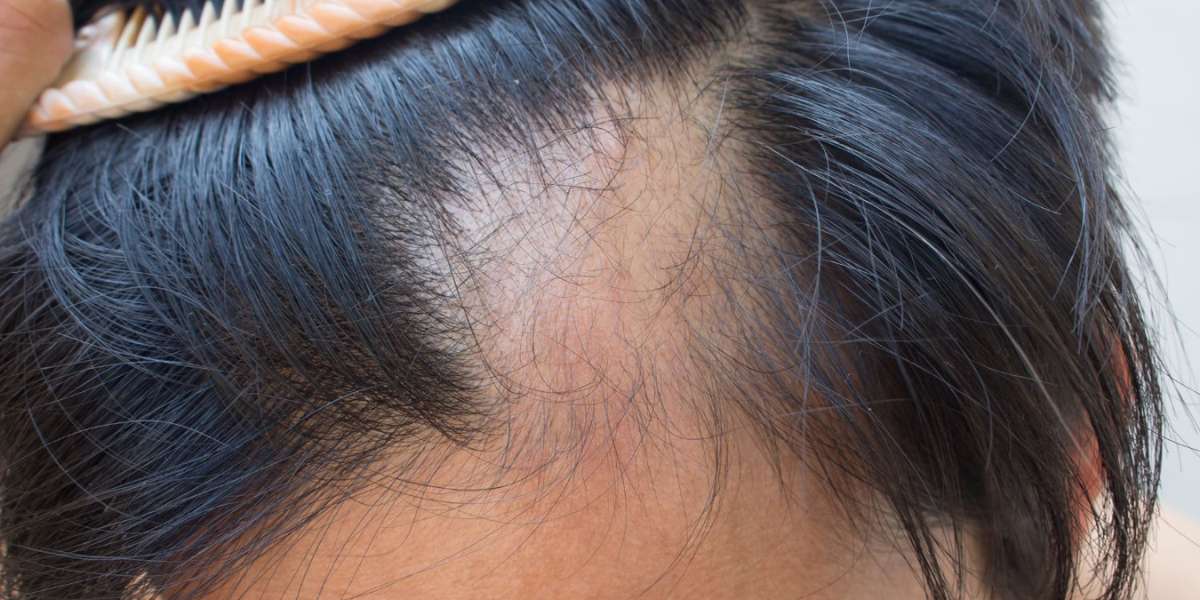
Losing hair can be a distressing experience that impacts both men and women alike. Understanding the causes, various types of hair loss conditions, and the emotional toll it takes is essential before deciding on the best approach to tackle the issue.
Understanding Hair Loss
Hair loss is a common condition with multiple factors, including genetics, hormonal imbalances, and certain medical conditions. Among the most prevalent types are androgenetic alopecia and alopecia areata, which can significantly affect one’s self-esteem and confidence.
Androgenetic alopecia is a common form of hair loss caused by genetic and hormonal factors, often referred to as male or female pattern baldness. On the other hand, alopecia areata is an autoimmune condition that leads to sudden and patchy hair loss.
There are both, surgical and non-surgical options to treat it. At Nvya Aesthetics, we offer both kinds of treatments. Dr. Hiren expertly handles surgical cases, and Dr. Krishi adeptly manages non-surgical cases in most instances.
Before we decide which option to opt for, it is important to know in detail about surgical and non-surgical options to treat hair loss.
Non-Surgical Options:
When it comes to non-surgical hair loss treatments, several effective options are available, each with its unique approach to combating hair loss. According to Dr. Krishi, the most common non-surgical options include-
Topical Medications: Topical treatments like minoxidil have shown success in slowing down hair loss and stimulating hair regrowth when applied consistently.
Finasteride: Finasteride, an oral medication, can be effective in preventing hair loss by reducing the levels of dihydrotestosterone (DHT), a hormone linked to male pattern baldness.
Laser Therapy: Low-level laser therapy is an innovative technique that can promote hair growth by stimulating hair follicles, leading to thicker and healthier hair.
PRP Therapy: Platelet-rich plasma (PRP) therapy involves using the patient’s blood to create a concentrated solution that is then injected into the scalp, encouraging hair growth through the body’s natural healing process.
PRP therapy for hair growth
PRP Therapy: Nourishing Follicles for Hair Growth
Surgical Solutions:
For those seeking more permanent and drastic solutions, surgical interventions offer promising results.
Hair Transplantation: Hair transplantation techniques, including Follicular Unit Transplantation (FUT) and Follicular Unit Extraction (FUE), have revolutionized hair restoration. FUT involves removing a strip of hair-bearing skin and dissecting it into grafts, while FUE involves extracting individual hair follicles directly from the donor area.
Revive Your Hairline: Surgical Hair Transplant
Restoring Natural Hair Growth with Surgical Precision
The choice of hair loss treatment, whether surgical or non-surgical, can depend on the underlying cause of hair loss. For certain types of hair loss, such as androgenetic alopecia, both surgical and non-surgical options may be suitable.
Non-surgical treatments like minoxidil and finasteride can help slow down hair loss and promote regrowth in cases of androgenetic alopecia. However, in more advanced cases, where non-surgical methods may not be sufficient, hair transplantation surgery could be a more effective option.
In the case of alopecia areata, which is an autoimmune condition, non-surgical treatments like topical steroids or immunotherapy may be considered to address the underlying immune response and promote hair regrowth in affected areas.
Ultimately, the choice of treatment depends on factors such as the specific type and stage of hair loss, the individual’s overall health, their preferences, and their desired outcomes.
Dr. Krishi and Dr. Hiren determine the most appropriate treatment plan based on the underlying cause and individual circumstances. However, apart from the above medical conditions, the following additional factors also affect the choice between both of the procedures.
Factors to Consider:
Making the right choice between surgical and non-surgical treatments depends on various factors that are unique to each individual.
Cost: Non-surgical treatments are generally more affordable initially, while surgical procedures require a more significant upfront investment. However, considering the long-term benefits of surgical interventions, it might be a cost-effective solution in the long run.
Desired Results: Understanding the results you hope to achieve is crucial. Non-surgical treatments can slow down hair loss and promote regrowth, while surgical options offer more significant and permanent changes.
Degree of Hair Loss: The extent of hair loss plays a crucial role in determining the most suitable treatment. Non-surgical options are ideal for early-stage hair loss, while surgical procedures are better suited for those with more extensive hair loss.
Age and Health: Age and overall health can influence the choice of treatment. Surgical procedures might be riskier for older individuals or those with certain health conditions.
Personal Preferences: Personal preferences also play a role in the decision-making process. Some individuals might prefer non-invasive treatments, while others prioritize long-lasting results.
Choosing the right hair loss treatment should be an informed decision, considering all the relevant factors and seeking professional guidance. It involves the following steps.
Decision-Making Process:
Thorough Research: Conducting thorough research on both non-surgical and surgical options, as well as their potential outcomes and risks, is essential to make an educated choice.
Professional Consultation: Consulting with a qualified hair loss specialist or dermatologist allows individuals to receive personalized recommendations based on their unique circumstances.
Realistic Expectations: Setting realistic expectations is vital for any hair loss treatment. Understanding the limitations and potential outcomes of each option will prevent disappointments and ensure satisfaction with the chosen treatment.
Deciding between surgical and non-surgical options for hair loss is a significant step towards regaining confidence and self-esteem. By understanding the causes and types of hair loss, exploring the available treatments, and considering individual factors, individuals can make an informed decision.
Seeking professional advice and having realistic expectations will be crucial in achieving the best possible results. Whether you opt for a non-invasive approach or a surgical intervention, taking control of your hair loss journey can lead to a happier and more confident you.
At NVYA Aesthetics, you can opt for both, surgical as well as non-surgical hair transplant procedures.
Book Appointment









